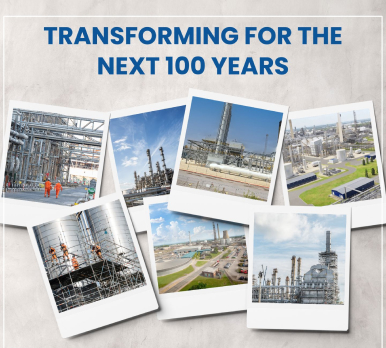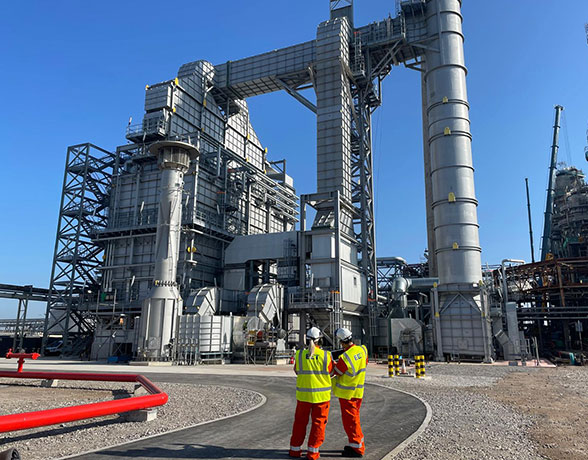The Wates Principles
We have embedded the Wates Corporate Governance Principles for Large Private Companies into our structures and processes. All elements of the Wates principles have been adopted by the Group.

We have embedded the Wates Corporate Governance Principles for Large Private Companies into our structures and processes. All elements of the Wates principles have been adopted by the Group.


We are committed to playing a key role in the decarbonisation of the UK economy, with ambitious plans to build an energy transition hub at our site in the North West of England and to become the world’s first low carbon process refinery.
Our vision is ‘Performing today – Transforming for Tomorrow’ and this aligns with the UK Government’s Ten Point Plan on the Green Industrial Revolution and with its British Energy Security Strategy.
The Group forms part of Essar Energy Transition which is playing a major role in accelerating the UK’s low carbon transformation, supporting the region’s decarbonisation ambitions, and creating highly skilled jobs. Our energy transition plans are underpinned by our Environment, Social and Governance approach.
The Board promotes the purpose within the organisation and ensures that our strategy, corporate scorecard and culture align with the purpose.

Each year, our Board undertakes an in-depth review of our strategy, including the business plan for the following five years. Once approved by the Board, the plan and strategy form the basis for financial budgets, resource plans and investment decisions, and the future strategic direction of the Group.
Specific business objectives are evaluated on a number of factors, including how they deliver the strategic plan, financial outcomes (using long-term cash flow modelling) and impact on business reputation. The insight provided from stakeholder engagement also informs both strategic and operational decision-making.

We are taking significant steps to lead the industrial decarbonisation agenda as announced by the UK Government as part of the Ten Point Green Industrial Plan in November 2020 and confirmed in the policy document, the ‘British Energy Security Strategy’ April 2022 and more recently the Clean Power 2030 Action Plan
Our Company’s Board comprises one executive director and five non-executive Directors. The individual directors bring a wide range of experience, aligned to our purpose, including finance, sales, marketing, HSE and trading, project execution and governance and risk assessment. All director appointments are subject to approval by the Remuneration and Nomination Committee.












Our Board meets regularly throughout the year to review the performance of the Group and deal with matters requiring board approval. It also convenes on a more ad-hoc basis, as required, to manage our business.
The Board is mindful in all of its dealing of the desire for to maintain our reputation for high standards of business conduct and acts, through its Governance processes, to achieve this aim. The Board and individual Directors have a clear understanding of their responsibilities and accountabilities.
The Chief Executive officer and the rest of his Executive Leadership are responsible for implementing the strategy set by the Board and leading the day-to-day running and operations of the Group. Quarterly performance updates are provided to the Board by the Executive Leadership Team and the Board meet with the Executive Leadership on a regular basis.

Our Board has established a Remuneration and Nomination Committee. The Committee determines the terms and conditions of service of Executive Directors. The remuneration and terms and conditions of appointment of non-executive directors are set by the Board. Remuneration is designed to be appropriate and fair, to recruit and retain high quality directors, management and workforce.
The committee also sets objectives for performance related incentives, aligned with our purpose and strategic objectives, for Executive Directors and other members of the Executive Leadership Team, and reviews performance against those objectives.
Our Board ensures a dialogue with all stakeholders including: our employees, our ultimate controlling shareholder (Essar Global Fund Limited), Government departments, local councillors, regulators, customers, suppliers and the communities local to our operations.
We place a high level of importance on engagement with its various stakeholders, at a local, national and international level. Stakeholder engagement is supported and enhanced through membership of and active participation in a number of trade associations.
The Board has identified and develops effective working relationships with those stakeholders who have a material interest in the Group and ensures that insight provided from this engagement informs both strategic and operational decision-making.
We are committed to applying the highest standards of ethical conduct and integrity in our business activities. Every employee and individual acting on our behalf is responsible for maintaining our reputation and for conducting business honestly and professionally.
We benefit from carrying out business in a transparent and ethical way. Our Board and Executive Leadership Team are committed to implementing and enforcing effective systems to prevent and eliminate bribery, in accordance with the Bribery Act 2010.
We have an anti-bribery and corruption approach which is included in the Code of Conduct. These policies apply to all colleagues and all must complete mandatory anti-bribery and corruption policy training regularly as a prompt to ensure understanding of and compliance with our approach.